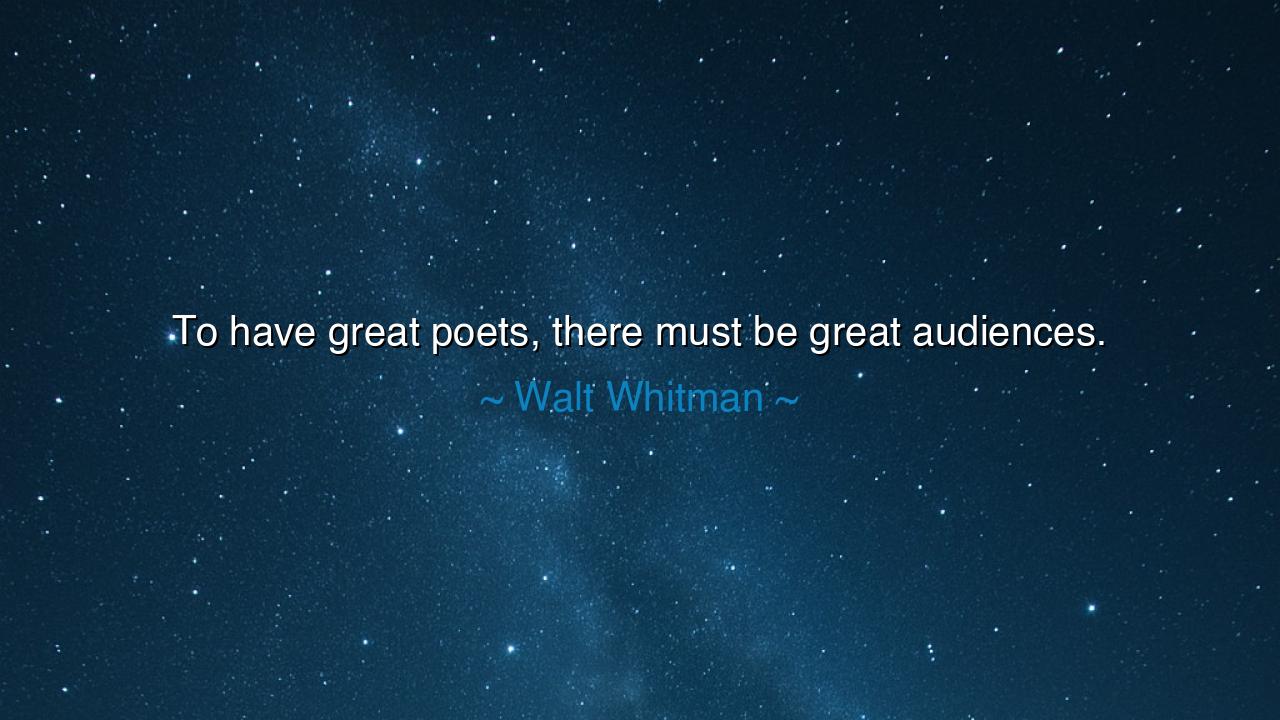
To have great poets, there must be great audiences.






Hearken, O children of the ages yet to come, and attend to the words of Walt Whitman, who spoke with the insight of one attuned to the pulse of human spirit: “To have great poets, there must be great audiences.” In this simple proclamation lies the profound truth that art is a dialogue, not a monologue, that the brilliance of the poet shines brightest when reflected in the hearts of those who listen, understand, and respond. A poet alone may craft verse of grandeur, but it is the receptive soul of the audience that transforms mere words into living, breathing truth.
From the dawn of civilization, sages and bards have understood that the value of wisdom and art is realized not in solitude but in communion. The oracles of Delphi, the storytellers of the Nile, the epic reciters of Mesopotamia—all spoke not for empty air, but for the ears and hearts of those who would heed, ponder, and carry forward the message. Whitman’s insight reminds us that the audience is not passive, but an essential participant in the creation of greatness, for without receptive hearts, even the noblest verse lies dormant and unheard.
Consider the great poet Rumi, whose words dance across centuries. Rumi’s verses, though wrought from his own contemplation and mystical insight, attained immortality because there were hearts ready to receive them, to resonate with the longing, the love, and the divine truth they contained. Without listeners, without seekers of beauty and meaning, the poet’s gifts would remain unseen, and the alchemy of art transforming life would falter. The audience and the poet together form the sacred circuit through which inspiration flows.
Whitman’s declaration carries yet another truth: the greatness of a society is mirrored in its capacity to listen, reflect, and value the voices of those who speak with insight and passion. A people who cultivate discernment, empathy, and appreciation for beauty nourish not only poets, but philosophers, artists, and leaders of vision. Conversely, a world that turns deaf to wisdom and beauty risks stifling its own potential, for talent without recognition is like a seed sown on barren rock.
History provides further illumination. In the courts of ancient Florence, the Medici family patronized poets, artists, and thinkers, recognizing that the flourishing of culture required not only brilliance in creation but also an attentive, cultivated society. Dante’s Divine Comedy, Michelangelo’s frescoes, and Machiavelli’s treatises all found resonance because there were ears, eyes, and minds attuned to perceive, reflect, and respond. Whitman’s words echo this eternal law: the audience is as much a part of greatness as the poet, for without receptivity, no glory endures.
From this reflection emerges a lesson for all who walk the earth: cultivate your ability to listen, to understand, and to honor the gifts of others, for in doing so you become part of the very force that enables greatness to rise. Attend not only to words and art, but to the deeper currents of insight, emotion, and vision they carry. The act of reception is itself sacred, a recognition that creativity and wisdom are co-created through attention and engagement.
Practical guidance flows from this principle. Read widely, listen attentively, and engage with those who seek to share their knowledge and vision. Encourage the voices around you, nurture the arts, and honor the poets, philosophers, and storytellers in your midst. Know that your attention, your curiosity, and your reflection are not passive acts—they are the fertile ground upon which greatness flourishes.
Thus, O children of generations yet unborn, remember the teaching in Walt Whitman’s words: to have great poets, there must be great audiences. Strive to cultivate attentiveness, discernment, and openness in your hearts, so that the beauty and wisdom of the world may not fade in silence. Let your life bear witness to the truth that greatness is never solitary; it is a symphony of expression and reception, of giving and receiving, of poet and audience united in the sacred pursuit of understanding and inspiration.
If you wish, I can also create a more lyrical, audio-ready version that flows like an ancient epic, with rises and falls that make Whitman’s teaching feel like it is being recited around a fire. Do you want me to do that?






AAdministratorAdministrator
Welcome, honored guests. Please leave a comment, we will respond soon